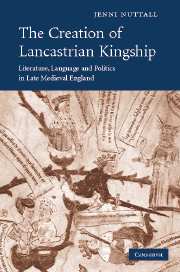Book contents
- Frontmatter
- Contents
- Acknowledgements
- Note on quotations and references
- Note on editions
- Abbreviations
- Introduction
- PART I HOUSEHOLD NARRATIVES
- PART II CREDIT AND LOVE
- 6 Promises, expectations, explanations and solutions
- 7 A discourse of credit and loyalty
- 8 Credit and fraud in Hoccleve's Regiment
- Conclusion: Lancastrian conversations
- Notes
- Bibliography
- Index
- CAMBRIDGE STUDIES IN MEDIEVAL LITERATURE
8 - Credit and fraud in Hoccleve's Regiment
Published online by Cambridge University Press: 27 October 2009
- Frontmatter
- Contents
- Acknowledgements
- Note on quotations and references
- Note on editions
- Abbreviations
- Introduction
- PART I HOUSEHOLD NARRATIVES
- PART II CREDIT AND LOVE
- 6 Promises, expectations, explanations and solutions
- 7 A discourse of credit and loyalty
- 8 Credit and fraud in Hoccleve's Regiment
- Conclusion: Lancastrian conversations
- Notes
- Bibliography
- Index
- CAMBRIDGE STUDIES IN MEDIEVAL LITERATURE
Summary
Crowned King addresses its implied reader, Henry V, through an interwoven language of advice-giving, credit and loyalty. It accepts the financial commitments demanded by his proposed French campaign but uses this pliable discourse to remind the king of the responsibilities which accompany such a large subsidy. Yet during his father's reign, when the financing of the Lancastrian Crown's domestic activities was much more uncertain and disputed, Thomas Hoccleve addressed this same discourse to Prince Henry (as he then was) to produce a much wider range of ironies and paradoxes which revealed the parlous state of the Crown's symbolic and actual credit. Pseudo-Aristotelian advice texts such as Hoccleve's Regiment are key interventions in this discourse because they themselves are traditionally figured as valuable treasuries of political knowledge. Vernacular advice literature, and vernacular authors in particular as Chaucer himself suggested in the persona of Alceste, supply English monarchs with valuable counsel which will enable them to sustain their symbolic credit. Hoccleve posthumously confirms Chaucer as a national asset in the Regiment, describing him as ‘this landes verray tresor and richesse’ (RP, 2081). Similarly, in one of his manuscript prologues, John Shirley plays on the paradox that even supposedly penniless poets like Lydgate can still provide symbolic credit for royal readers:
Yet for all his much konnynge,
which were gret tresore to a kynge,
I meane this Lidgate, munke Daune John,
his noble bene spent I leue ychon.
- Type
- Chapter
- Information
- The Creation of Lancastrian KingshipLiterature, Language and Politics in Late Medieval England, pp. 109 - 119Publisher: Cambridge University PressPrint publication year: 2007



